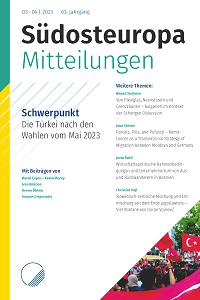Slowenisch-serbische Mischung und Entmischung seit dem Ende Jugoslawiens. Die vier Bestsellerromane von Goran Vojnović 2008–2021
Slovenian-Serbian Mixing and Unmixing since the End
of Yugoslavia. The Four Bestseller Novels by Goran Vojnović (2008–2021)
Author(s): Christian VossSubject(s): Slovenian Literature
Published by: Südosteuropa Gesellschaft e.V.
Keywords: Goran Vojnović;
Summary/Abstract: The Slovenian author Goran Vojnović has written four novels where he tells the story of mixed-nationality marriages and families and how they cope with nationalist exclusion and disillusionment since the end of Yugoslavia. By focusing on youth culture among Yugoslav immigrants from the southern republics (so-called Čefurji) in Ljubljana’s fringe area Fužine, Vojnović is able to project the hetero-stereotypizations between the “prosperous and disciplined West” and the “poor and uncivilized Balkans” within the former Yugoslavia, even within one country and one city. The self-ascription of the youth gang as Čefurji is not ethnic (and includes Serbs as well as Muslims from Bosnia), but is a social category based on common experiences of discrimination. The topic of hybrid post-Yugoslav identities is further developed in the novels “Yugoslavia, my Fatherland” and “The Fig Tree”, where Vojnović in a trans-local opening tells the family story of three generations in Slovenia, Bosnia and Serbia. The legacy of Yugoslav trans-republican mobility and multiculturalism is described without nostalgia as social practice within the families.
Journal: Südosteuropa Mitteilungen
- Issue Year: 63/2023
- Issue No: 03-04
- Page Range: 97-108
- Page Count: 12
- Language: German
- Content File-PDF

